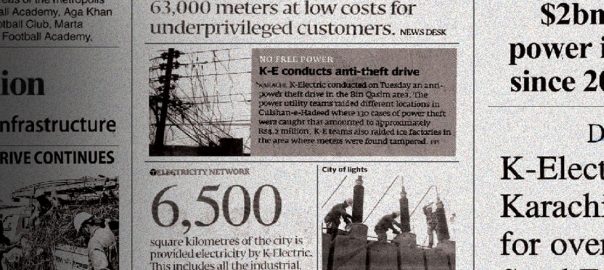Karachi, July 15th 2020: K-Electric hosted a press conference at its Office to allay the concerns of Karachi consumers around the power supply situation and address misinformation around various power-related issues. The conference which, was hosted by Chief Executive Officer (CEO) K-Electric, Moonis Alvi, Chief Financial Officer (CFO) Aamir Ghaziani and Chief Distribution Officer (CDO) Amer Zia, focused on transparently addressing the prevailing myths around the power utility.
CEO K-Electric, Moonis Alvi focused on K-Electric’s ambitious investment plan which would see USD 2 bn spent across the power value chain over the next three years, including a 900 MW RLNG-fired power plant as well as downstream transmission and distribution upgrades. In addition K-Electric will be investing in interconnection infrastructure with a view to evacuating additional power from the national grid on priority. The Federal Government had also committed to expedite infrastructure upgrades at the national grid side so that 300 MW additional power could benefit Karachi in 2021, supplemented by a further 400 MW in 2022 and 800MW in 2023. In this regard, the power utility has already sought necessary regulatory and governmental approvals, and following the timely receipt of the same, K-Electric will be in a position of materialize the large-scale power projects that would move Karachi into a power surplus position, Moonis briefed. Regarding the current power supply situation of the city, the CEO appreciated the support of the Federal Government in streamlining fuel supplies which had created a considerable strain on generation units. He added that gas and furnace oil related arrangements had been discussed and agreed with the Ministry and depending on appropriate gas pressure and regular fuel supplies, KE’s power generation could be maximized. The technical fault at one turbine of the Bin Qasim Power Station (BQPS) – 1 was also being swiftly rectified with teams working around the clock and power supply position was expected to be fully normalized shortly.
Since 2009, KE has invested over USD 2.4 bn in power infrastructure upgrades and additions, adding 1057 MW to its own generation capacity and 1000 MW through Power Purchase Agreements, building 13 grid stations and upgrading distribution system through hundreds of additional feeders and thousands of additional transformers. These have reduced Transmission and Distribution (T&D) losses from 36% to 19%, resulting in load-shed exemption for 77% of Karachi including all industrial zones, Alvi reminded.
The CEO K-Electric also addressed the issue of load-shedding in Karachi by saying that load-shed was in line with the National Power Policy 2013, in accordance with the rest of the country, and was purely on account of power theft. Even in areas with extremely high levels of power theft, cumulative load-shed hours did not exceed 8 hours. Load-shed schedules are uploaded to the KE Website on a daily basis and SMS are also sent out to all customers who are registered with our 8119 SMS service he stated. Sometimes faults, tripping incidents or any outages due to emergency complaints can occur due to weather or environmental conditions and are rectified on priority even in the backdrop of COVID-19 which is creating workforce challenges he added. Load-management is only necessitated when generation capacity is compromised or demand outpaces supply on account of high temperatures and humidity as well as erratic power supplies from IPPs. He explained that the current situation is unprecedented and in an effort to provide relief to its residential customers during the late-night hours, KE has managing load through industrial load-shedding despite this impacting negatively on the company’s financial health and profitability.
He also clarified prevailing misconceptions about K-Electric’s billing highlighting that the power tariff is set by for all DISCOs by the National Electric Power Regulatory Authority (NEPRA) and K-Electric cannot make any modifications to it. Similarly K-Electric’s meters are manufactured according to international standards and purchased from the same suppliers as all other DISCOs. He also debunked the myth, that K-Electric underutilizes its generation on Furnace Oil so as to reduce its costs. Rather, he said, fuel costs are passed through in line with the NEPRA approved mechanism and thus it makes no difference to K-Electric what fuel is utilized to generate power at the plants. Further to benefit Karachi-based customers, K-Electric’s upcoming plants are efficient and utilize lower-cost fuels which would make power more affordable and reduce the impact on the National Exchequer.
He closed the press conference by saying that, ”Our first focus right now is addressing the upcoming Monsoon challenges which include urban flooding and drainage issues. We are working closely with all relevant authorities in the interest of public safety safety and we request the support of our friends in the media fraternity to further propagate messages related to public health and safety.”


